Read the Report
The COVID-19 pandemic has seen an unprecedented increase in the use of social listening methodologies for humanitarian and health response, Risk Communication and Community Engagement (RCCE), and “infodemic” management.
While social listening for humanitarian and health purposes is not new, the pandemic has dramatically increased its adoption due to the challenges associated with in-person community engagement when emergency public health and social measures (PHSM) are active. This increased attention has resulted in a variety of social listening outputs that are produced by humanitarian and health organizations and disseminated in various Risk Communication and Community Engagement (RCCE) spaces at the national, regional, and global level. However, there is a gap in evidence when it comes the actual impacts of its utilization. This research presents an initial review of the potential impacts of, and barriers to, the effective use of social listening data.
The study differentiates social listening from community feedback mechanisms, given that the use and impacts of the former have already been widely studied. This study observes barriers, challenges, and potential impacts for social listening activities both on and offline.
Traditionally, social listening has been a tool used by the private sector to monitor brand popularity and to inform marketing strategies. The practice focuses on tracking and analyzing real-time social media data to provide insights into the public’s perceptions and emotions towards their product. To fill this need, multiple software and applications built on AI social media analytics provide social listening services predominantly for the private sector. This is relevant because, in many cases, humanitarian organizations rely heavily on these same tools, which have not been designed with humanitarian purposes in mind. While there are many benefits to these kinds of software, the humanitarian sector has specific needs that, if overlooked, can result in important barriers to the effective actioning of social listening findings and its expected results. The study explores these limitations in its discussion of barriers.
This research is based on the analysis of seven Key Informant Interviews (KIIs) with organizations that are conducting social listening activities as part of the humanitarian and health response to COVID-19. The interviews included key informants from UNICEF, Africa Infodemic Response Alliance (AIRA), IFRC, Nigeria Centre for Disease Control, Internews and Ground Truth Solutions.
In each of those organizations we interviewed informants directly involved in the social listening efforts. The positions held by those interviewed included: social and behavior change specialists, COVID regional response managers, project managers and coordinators, communication officers, RCCE country support officers, and “infodemic” managers.
Much of the discussions focused on the COVID response from March 2020 onwards. However, our questions – and the discussions with interviewees – were not limited exclusively to COVID; many of the tools and methods that have been strengthened and utilized during the pandemic are now being deployed for other uses and crises. Often these are health emergencies, but other areas of humanitarian intervention are also increasingly using (or planning to use) social listening.
The findings are not meant to be representative or exhaustive of all social listening efforts in the humanitarian and health sectors, and neither are they presented as an evaluation of the work being carried out by the organizations interviewed. The research did not follow a systematic review of organizations’ own monitoring, but rather, was based on anecdotal reflections of key decision makers within each project to observe and capture key lessons learned. The study is meant to serve as a first step towards a community brainstorming about the opportunities and barriers that can be encountered in social listening projects accompanied with potential recommendations and observations. While the study presents overarching barriers, it is important to note that there is a diversity of methodologies and scopes in social listening efforts and that the barriers and recommendations are not always applicable to every project.
Authors: Alejandro Posada, Rocio Lopez Inigo, Jamie Sport
If you want to know more about Internews responses to health emergencies, please get in touch with Internews humanitarian team at [email protected]
